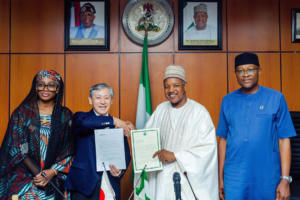The Federal Government of Nigeria has signed agreements with the Embassy of Japan and the Japanese International Cooperation Agency for the Rice Seeds Production System and the strengthening of Nigeria Centre for Disease Control (NCDC) Projects for the socio-economic development of the country.
The Minister of Budget and Economic Planning, Sen. Abubakar Atiku Bagudu signed the agreements on behalf of the Federal government with the Japanese Ambassador to Nigeria, Matsunaga Kazuyoshi in his office yesterday.
 Sen. Bagudu noted that these two important projects which were aimed at enhancing Nigeria’s socio-economic development were incubated ideas that were coming to fruition.
Sen. Bagudu noted that these two important projects which were aimed at enhancing Nigeria’s socio-economic development were incubated ideas that were coming to fruition.
He added “This idea synchronizes with the Nigeria system as our main objective is to include everyone so that small-scale holders particularly family based, can do better rather than be displaced by large-scale farmers and mechanization”.
The Rice Seed Production Project is aimed at achieving self-sufficiency in rice Production and input substitution, focusing on enhancing quality of breeder and foundation seeds, equipment procurement for rice cultivation, testing, inspection and post harvest processing.
It will further bolster the capacity of National Cereals Research Institution (NCRI) Badeggi, Niger State and its outstations. The proposed sites for the project are in Niger and Oyo State.
The Project, strengthening Diagnostic Capacity of Nigeria Centre for Disease Control entails installing Biosafety level (BSL) 2 and 3 laboratories and equipment at the National Reference Laboratory of NCDC.
This initiative, which is being done in collaboration with the Japanese Government through the Japanese International Cooperation (JICA) will cushion infections disease surveillance and national health security. The proposed sites for the laboratories are Gaduuwa, Abuja and Yaba in Lagos state.
The Japanese Ambassador, Matsunaga Kazuyoshi noted that “The projects are testament to our continued cooperation and shared commitment to improving the lives of the Nigerian citizens”. He revealed that the Japanese Government had supported Nigeria’s effort to tackle infectious diseases in the health sector.
He further highlighted that the Project for Strengthening Diagnostic Capacity of the Nigerian Center for Disease Control would enhance Nigeria’s capacity to detect and respond to infectious diseases by establishing a state-of-the-art Biosafety level 3 Laboratory within the NCDC.
He disclosed that this partnership extended to the Agriculture Sector where Japan had contributed to enhancing productivity, food security and sustainable practices.
Amb. Kazuyoshi continued that the Project for Strengthening Rice Seed Production System is aimed at meeting Nigeria’s increasing Rice demand by enhancing certified seed quality and boosting production; this initiative supports Nigeria’s goal to diversify its economy which also has international potential of Agricultural export as 40% of the Sesame seeds consumed in Japan are sourced from Nigeria which demonstrates the high quality and global appeal of the Nigerian Agricultural products, he asserted.
He therefore pledged Japanese commitment to working hand-in-hand with Nigeria to achieve those goals and create a more resilient and inclusive future for the country.
Julie Osagie-Jacobs
Director (Information)
26th April, 2024
